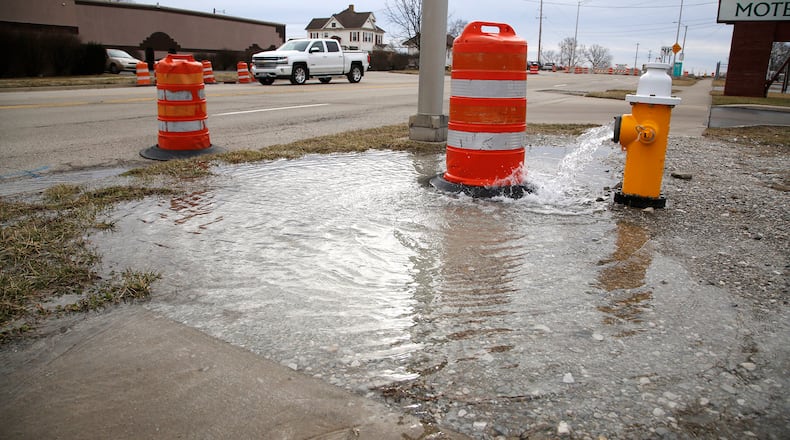Dayton’s combined water and sewer charges are significantly lower than many other local jurisdictions, and the increased revenue will help fund millions of dollars in important investments in the three separate utility systems, city officials say.
“We wanted to make sure that we were recommending going forward for the next three years a rate increase that really reflected the needs of our utility and that would support the investment in the infrastructure that we’ve got,” said Michael Powell, Dayton’s director of the water department.
Water concerns were front of mind for many Dayton residents in 2019 after two massive water outages, and residents have shrinking confidence in the purity and cleanliness of the city’s tap water.
MORE: What you need to know: Understanding Dayton’s drinking water issues
The Dayton City Commission this week had its first reading of an ordinance that increases the city’s charges for water, wastewater and storm water services.
The legislation, which should have its second and final reading next week, increases water rates 5% each of the next three years. Sewer rates would rise 7.8% in 2020, 2021 and 2022. Storm water rates would increase 2.3% for three consecutive years.
“The combined impact of that is 5.9%,” Powell said. “The combined impact of that for the average residential customer is about $12 per quarterly bill, or about $1 per week.”
The city hasn’t had a larger rate hike for water service since 2008, and the last larger sewer rate hike was in 2006.
Since 2010, the rate hikes for water and sewer have not exceeded 3.8%. The city had no rate hikes in 2014, 2016 and 2019.
The city, with the help of a consultant, did financial modeling to try to keep rate increases fairly steady and avoid large “swings or spikes” in charges, Powell said.
MORE: City of Dayton seeks more generators for water system after tornado, outage
Between 2000 and 2003, the city had no rate hikes. But come 2004, sewer rates increased 14% and storm increased 96.3%, according to city data.
Water rates increased nearly 23% in 2005 and 35.5% in 2006.
City leadership “did no rate increases for many, many years, and then what happens is you have to have these really large swings — and that’s something we do not want to do,” said Dayton Mayor Nan Whaley.
Utilities and water quality is the city’s top priority, but it’s important to make sure the services are affordable, and gradual rate hikes to help pay for infrastructure investments is the best long-term way to avoid price spikes in the future, Whaley said.
“This is a big issues for mayors across the country,” she said. “Cities are seeing increases that sometimes are 100% increases — and I’m not exaggerating.”
The average residential household uses about 3,000 cubic feet of water every quarter, officials say, and in Dayton on average every quarter they pay about $97 for water, $75.20 for sanitary and $7.84 for storm utility services.
Through the third quarter of 2019, the city received about $36.3 million in revenue from water charges, $26.2 million from sewer charges and $5.9 million from storm payments.
Additional revenue is needed to pay for capital improvement projects benefiting the three separate utility systems, officials say.
The city continues to replace 1% of its 800 miles of water distribution pipes each year, Powell said.
MORE: These chemicals are in our water. Here are 15 things you should know if you drink Dayton water.
Replacing 8 miles of piping each year costs about $9.5 million, and the city also plans to invest $5.5 million each year into its water treatment facilities, he said.
Dayton also plans to replace or refurbish 1% of its wastewater collection pipes each year — about 7.5 miles annually, the city said.
Annually, that costs about $5 million, the city said, and $40 million also is needed for upgrading and “upsizing” some sections of pipes.
Last year, the city completed a master plan for its Water Reclamation facility that identifies needed replacement projects and upgrades for regulatory compliance, Powell said.
In the next two decades, the facility will require about $325 million worth of upgrades, he said.
The city also plans to spend $5 million per year on storm water pipes and pump stations and flood gates and outfalls, the city said.
This year, the rate hikes are projected to produce about $1.2 million in additional revenue for water and $2.2 million more for sanitary sewer services.
MORE: Montgomery County: City of Dayton water issues put community at risk
Since 2013, the city of Dayton water department has completed 154 projects and shelled out about $175 million on capital improvements.
“While these projects come at a cost, they are also necessary to make sure our system continues to perform at a high level,” Powell said.
He later said the goal is to “leave a system that is an asset to the next generation and not a liability.”
Last year, Dayton's combined and sewer costs were about $172, which was much cheaper than many other jurisdictions in the region, according to a city of Oakwood survey.
Of 63 jurisdictions surveyed, Dayton’s combined costs were the third lowest.
Vandalia’s charges were about $190, while Oakwood’s were more than $252.
Beavercreek’s charges exceeded $302; Kettering’s were nearly $308; Trotwood’s were nearly $345 and Yellow Springs were nearly $572.
Two water emergencies in 2019 coincide with decreased faith in the city’s water.
A survey last year of Dayton residents found that about 53% of respondents were very or somewhat confident that Dayton’s tap water is pure and clean. That was a four-year low and was down from 60% in 2016.
About the Author

